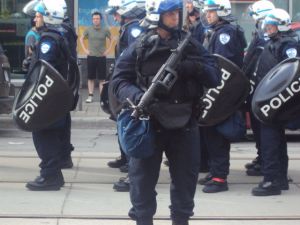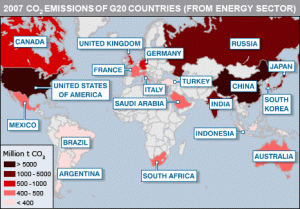
Sitting at my dining room table I watch a helicopter circle Toronto’s downtown core. It feels like a foreign city right now, a bit beyond reality.
It is hard not to feel the weight in the air in Toronto this weekend. With the G20 summit ongoing, the city seems to be buzzing with anticipation, anger, fear and uncertainty. The grey drizzle seems to be mother nature’s way of confirming and agreeing with the uneasiness of the city.
For the weekend, it appears as though the Toronto downtown core has become a militarized state. With the high amount of security both in bodies and by electronics, it almost feels like living in Orwell’s 1984-this may be a slight exaggeration, but it rings partially true. A security gate has been erected around the meeting centre, and citizens who walk within 5 feet of the fenced off area are questioned by security officials. One cannot help but feel as though our city has been transformed, and I feel myself just wanting to get the city back to itself. It is unfortunate that instead of being able to use the summit as a tool to create dialogue between citizens and politicians within our communities and at large, it seems to only create a greater barrier between those in power and those who are not.
Toronto has spent over a billion dollars in security for the summit, far exceeding any other previous summit security budget. Why so much money? For an interesting article that exposes the profit fusion between one of Canada’s largest multinationals and Canadian state security agencies check out: Rabble.ca Challenging Toronto’s Corporate Security Walls http://rabble.ca/news/2010/06/challenging-toronto%E2%80%99s-corporate-security-walls. The security wall acts as a metaphor to the citizens, neither your physical presence nor your ideas, thoughts and concerns are wanted at our meetings.
Regardless of your political affiliation, 1 billion dollars in security does seem quite excessive. Especially when one begins to think of how else this money could have been spent. For example 1 billion dollars invested in affordable public housing in Canada would go a lot further, and indeed be more beneficial for a greater amount of people. It could have been invested into the school system, health care, climate change or any other number of worthy social causes.
In regards to the summit itself, the Harper government has agreed to commit 1.1 billion towards Maternal Health. While this seems like a good start, it seems to small when compared to the fact the government spent 1 billion, as said above, on the summit itself.
Was this extensive security really needed? Or does it simply create a self fulfilling prophecy in the expectation of violence? As it turns out, there has been looting and even a few police cruisers set on fire. Yet, these few nonpeaceful or radical citizens (I will not call them protesters, because I believe through their violent and destructive behaviour it seems as though they have lost a sense in why they were protesting in the first place and are simply using the G20 as an excuse for violent outbursts) are unique in their violence. The majority of protesters simply would like their voices heard.
According to report by CTV over 600 protesters have been arrested, and detained.
“Our officers are out pro-actively looking for anybody with criminal intent,” said Const. Samantha Nulle. “Today they located a large number of people, they intercepted them and they did locate a number of street weapons on them.”
I witnessed from my bedroom window, police officers arresting three individuals walking down the street. It appears as though anyone protesting is now assumed guilty until proven innocent. Perhaps the over zealous arresting nature of the police forces in Toronto is linked to an attempt to create legitimacy for the insane security budget. Whatever the reason, it is a impediment on human rights.
photo by Andrew Moran
The G8 and G20 are exclusive in their very nature. As one obviously knows there are more than 20 countries in the world. Not only is the summit excluding the majority of countries in the world, it does not provide an avenue for the citizens of the countries it does represent to be heard. This leaves people with no choice but join forces in the street and to shout out their protests. When people are denied the right to express their concerns and questions what else can be expected? Protesters are not trying to impede and impose on anyones daily routine, but rather are trying to exercise their right to freedom of speech. A right that is being limited by security attempts in the city.
The G8/G20 summits seem to invoke strong emotion and feeling from even the most apathetic of people, regardless of which side of the political spectrum they may sit on. According to their mandate the G20 was created to be:
…the premier forum for our international economic development that promotes open and constructive discussion between industrial and emerging-market countries on key issues related to global economic stability. By contributing to the strengthening of the international financial architecture and providing opportunities for dialogue on national policies, international co-operation, and international financial institutions, the G-20 helps to support growth and development across the globe. http://www.g20.org/about_what_is_g20.aspx
What is interesting about this quote is the mandate does not define what growth and development entails. Of course we can assume they mean economic growth and development across the globe. But again, we must ask how and for whom? This economic growth may contribute to the GDP of a country, but what exactly does the GDP represent, and who and what informal markets are excluded?
The G20 consists of Argentina, Australia, Brazil, Canada, China, France, Germany, India, Indonesia, Italy, Japan, Mexico, Russia, Saudi Arabia, South Africa, Republic of Korea, Turkey, United Kingdom, USA and the European Union. Also on the board are managing directors and chairs of the IMF and the WB. According to the G20:
The G-20’s economic weight and broad membership gives it a high degree of legitimacy and influence over the management of the global economy and financial system.
This is a very telling and true statement. Essentially they are saying that these 19 countries, along with a representative from the EU, the IMF and the WB are responsible for how the world economy works. Of course within the IMF and the WB, only a handful of countries of the majority of the power. The US has 16.74 % of the vote in the IMF. The entire African continent has 1.34% of the voting power. Again, this is not inclusive. How can we as citizens be expected to have faith that decisions made in these meetings will be representative as to what is best for the citizens of the globe? Ideally, is this not what these summits are supposed to be heading towards?
 This post, is simply a critique. Which is something I always had issue with throughout my University years. We were constantly presented with what was wrong with the world, and never with solutions. So I will not leave you with that. The best way to create change, is to demand it, or rather in a more peaceful way, ask for it. If more and more people were to begin to write letters to their MPs asking for answers/change either within their communities or for their MP to push a bigger global issue, perhaps we would see a bit of political change. Not interested in simply writing letters? There are many organizations who are committed to attempting to create much needed change. Often they will have petitions to sign, or pre-written letters for you. We say take a 5 min challenge. Call someone, write someone or just think about the change you think needs to happen.
This post, is simply a critique. Which is something I always had issue with throughout my University years. We were constantly presented with what was wrong with the world, and never with solutions. So I will not leave you with that. The best way to create change, is to demand it, or rather in a more peaceful way, ask for it. If more and more people were to begin to write letters to their MPs asking for answers/change either within their communities or for their MP to push a bigger global issue, perhaps we would see a bit of political change. Not interested in simply writing letters? There are many organizations who are committed to attempting to create much needed change. Often they will have petitions to sign, or pre-written letters for you. We say take a 5 min challenge. Call someone, write someone or just think about the change you think needs to happen.
